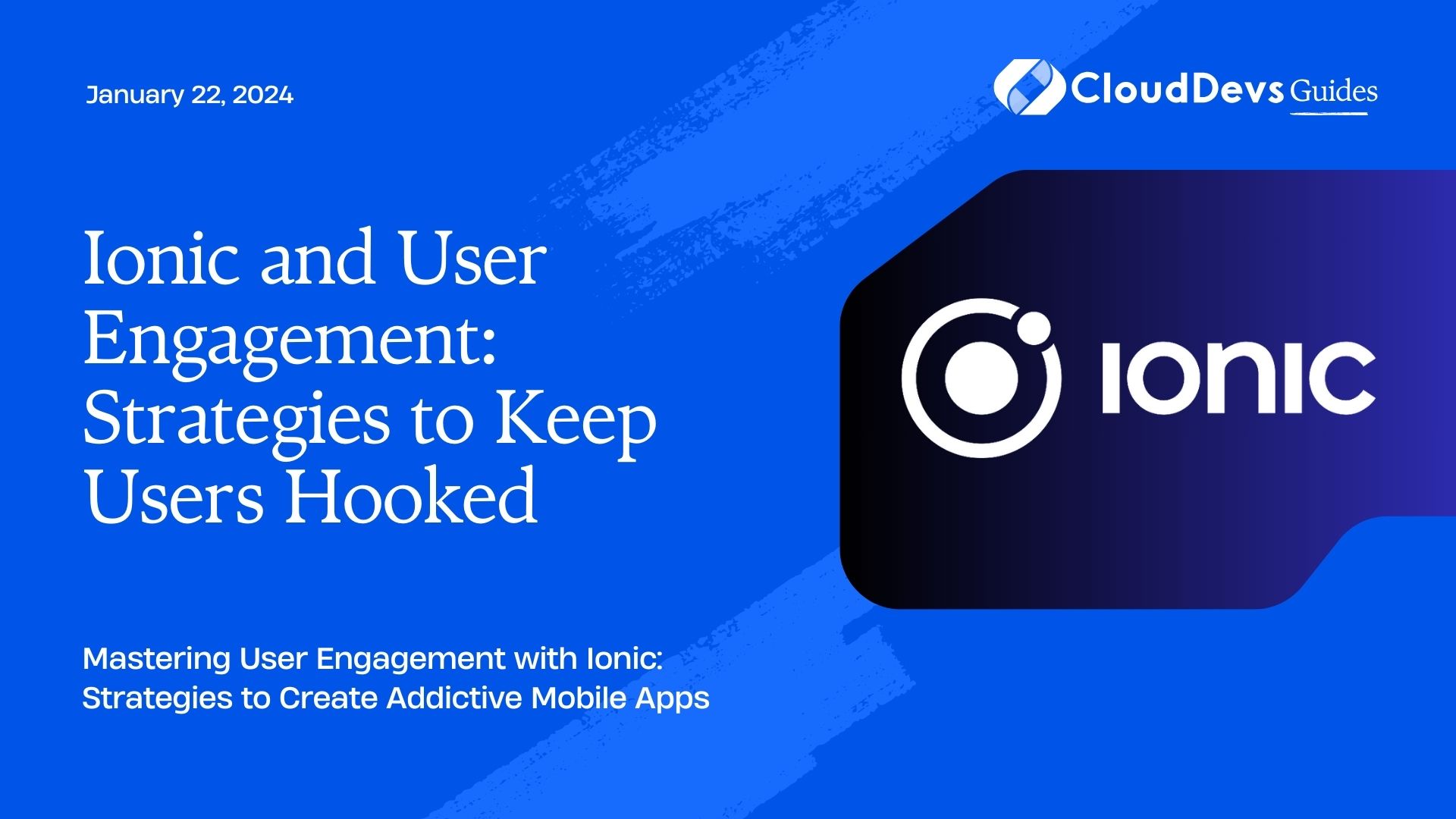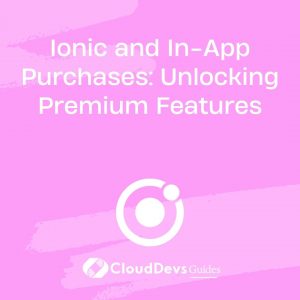Ionic and User Engagement: Strategies to Keep Users Hooked
User engagement is a critical factor in the success of any mobile application. Whether you’re building a social networking platform, e-commerce app, or a productivity tool, keeping users engaged is key to retaining them and ensuring the long-term success of your app. In this blog, we’ll explore how you can leverage the power of Ionic, a popular cross-platform mobile app development framework, to implement effective user engagement strategies that will keep users hooked to your app.
Table of Contents
Why User Engagement Matters
Before diving into the strategies and techniques, let’s understand why user engagement is so crucial for the success of your mobile app.
1. Retention and Loyalty
User engagement directly impacts user retention. When users find your app valuable and engaging, they are more likely to keep coming back. This repeated usage builds loyalty, increasing the lifetime value of each user.
2. Monetization
Engaged users are more likely to make in-app purchases, subscribe to premium features, or generate ad revenue by spending more time in your app. Higher engagement rates can significantly impact your app’s monetization potential.
3. Feedback and Improvement
Engaged users are more likely to provide feedback and suggestions for improvement. Their input can help you refine your app, fix issues, and add features that resonate with your audience.
4. Word of Mouth Marketing
Happy and engaged users are more likely to recommend your app to their friends and colleagues. Positive word-of-mouth marketing can significantly boost your app’s user base.
Ionic: A Powerful Framework for User Engagement
Ionic is a widely-used framework for building cross-platform mobile applications using web technologies like HTML, CSS, and JavaScript. Its ease of use, extensive library of pre-built UI components, and strong community support make it an excellent choice for app development. Here’s how Ionic can help you enhance user engagement:
1. Cross-Platform Compatibility
Ionic allows you to develop once and deploy your app on multiple platforms, including iOS, Android, and the web. This broad reach ensures that your engagement strategies can reach a wide audience.
2. Rich UI Components
Ionic offers a wide range of UI components that are not only visually appealing but also highly customizable. You can create stunning and engaging user interfaces without spending too much time on design and development.
3. Cordova Plugins
Ionic seamlessly integrates with Cordova plugins, which provide access to device-specific features. These plugins enable you to implement engagement features like push notifications, geolocation, and camera access.
Now that we understand the importance of user engagement and how Ionic can facilitate it let’s dive into some practical strategies and code samples to keep users hooked.
Strategy 1: Personalized Onboarding
The onboarding experience is your first opportunity to engage users effectively. Personalization is the key here. By tailoring the onboarding process to individual users, you can make them feel valued and invested in your app from the start.
Code Sample: Personalized Onboarding in Ionic
javascript
// Ionic code sample for personalized onboarding
import { Component } from '@angular/core';
@Component({
selector: 'app-onboarding',
templateUrl: 'onboarding.page.html',
})
export class OnboardingPage {
user: any; // Replace with your user data
constructor() {
// Fetch user data from your backend or local storage
this.user = this.userService.getUserData();
}
}
In this code sample, we fetch user data and customize the onboarding process based on the user’s profile.
Strategy 2: Gamification
Gamification is a powerful engagement strategy that adds elements of fun and competition to your app. Users are more likely to stay engaged if they have goals to achieve or rewards to earn.
Code Sample: Adding Gamification to Ionic App
javascript
// Ionic code sample for adding gamification
import { Component } from '@angular/core';
@Component({
selector: 'app-game',
templateUrl: 'game.page.html',
})
export class GamePage {
score: number = 0;
// Increment score when the user performs certain actions
increaseScore() {
this.score += 10;
}
}
In this example, we have a simple game where users can earn points by taking specific actions within the app.
Strategy 3: Push Notifications
Push notifications are an excellent way to re-engage users and bring them back to your app. You can send personalized messages, updates, or reminders to keep users informed and interested.
Code Sample: Implementing Push Notifications in Ionic
javascript
// Ionic code sample for push notifications
import { Push, PushObject, PushOptions } from '@ionic-native/push/ngx';
constructor(private push: Push) {}
// Configure push notification options
const options: PushOptions = {
android: {},
ios: {
alert: 'true',
badge: true,
sound: 'false',
},
};
// Initialize push notification
const pushObject: PushObject = this.push.init(options);
// Register for push notification events
pushObject.on('notification').subscribe((notification: any) => {
// Handle notification here
});
pushObject.on('registration').subscribe((registration: any) => {
// Handle registration here
});
pushObject.on('error').subscribe(error => {
// Handle error here
});
This code demonstrates how to configure and implement push notifications in an Ionic app, ensuring that users stay informed and engaged.
Strategy 4: In-App Messaging
In-app messaging allows you to communicate with users while they are actively using your app. You can provide tips, updates, or assistance, making the user experience more engaging and personalized.
Code Sample: Adding In-App Messaging to Ionic
javascript
// Ionic code sample for in-app messaging
import { Component } from '@angular/core';
import { AlertController } from '@ionic/angular';
@Component({
selector: 'app-chat',
templateUrl: 'chat.page.html',
})
export class ChatPage {
constructor(public alertController: AlertController) {}
// Show an in-app message
async showInAppMessage(message: string) {
const alert = await this.alertController.create({
header: 'Message',
message: message,
buttons: ['OK'],
});
await alert.present();
}
}
In this example, we use the AlertController to display in-app messages to users, enhancing their engagement with the app.
Strategy 5: User Feedback and Surveys
Listening to user feedback is crucial for continuous improvement. Implementing feedback mechanisms and surveys within your app can help you gather valuable insights and make data-driven decisions.
Code Sample: User Feedback Form in Ionic
javascript
// Ionic code sample for user feedback form
import { Component } from '@angular/core';
import { FormBuilder, FormGroup, Validators } from '@angular/forms';
@Component({
selector: 'app-feedback',
templateUrl: 'feedback.page.html',
})
export class FeedbackPage {
feedbackForm: FormGroup;
constructor(private formBuilder: FormBuilder) {
this.feedbackForm = this.formBuilder.group({
feedbackText: ['', Validators.required],
rating: [5, Validators.required],
});
}
// Submit feedback to your server or analytics platform
submitFeedback() {
const feedbackData = this.feedbackForm.value;
// Send feedback data to your backend
}
}
This code snippet showcases a simple feedback form that allows users to provide feedback and ratings, helping you gather valuable insights.
Conclusion
User engagement is the lifeblood of any successful mobile app, and Ionic provides a robust framework to implement effective engagement strategies. By personalizing onboarding, adding gamification elements, utilizing push notifications, incorporating in-app messaging, and collecting user feedback, you can create a compelling and engaging user experience that keeps users hooked to your Ionic app.
Remember that user engagement is an ongoing process. Continuously analyze user behavior, iterate on your strategies, and adapt to evolving user preferences to ensure your app remains a valuable part of your users’ daily lives. With these strategies and code samples, you’re well on your way to building a highly engaging Ionic app that users will love.
Start implementing these strategies in your Ionic app today and watch your user engagement soar!
In this blog post, we’ve explored the importance of user engagement, how Ionic can enhance it, and practical strategies with code samples to keep users hooked to your app. By implementing these strategies, you can create a compelling and engaging user experience that leads to higher retention rates, increased monetization, and a loyal user base for your Ionic app.
Table of Contents








